连系动词用法详解(2)
- 格式:doc
- 大小:28.50 KB
- 文档页数:9
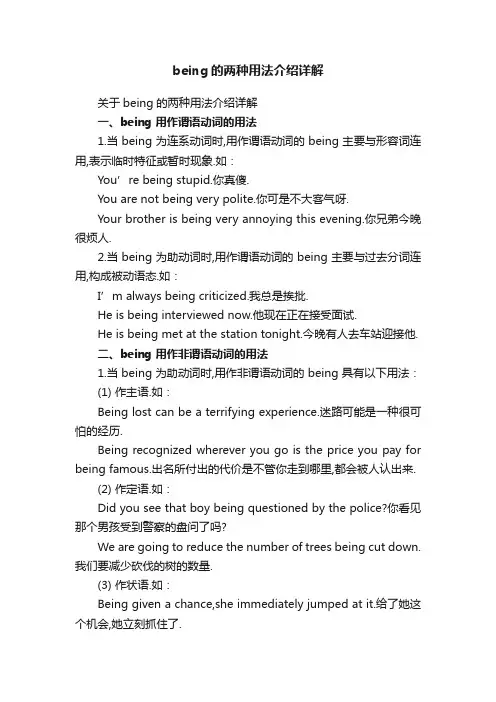
being的两种用法介绍详解关于being的两种用法介绍详解一、being 用作谓语动词的用法1.当 being 为连系动词时,用作谓语动词的 being 主要与形容词连用,表示临时特征或暂时现象.如:You’re being stupid.你真傻.You are not being very polite.你可是不大客气呀.Your brother is being very annoying this evening.你兄弟今晚很烦人.2.当 being 为助动词时,用作谓语动词的 being 主要与过去分词连用,构成被动语态.如:I’m always being criticized.我总是挨批.He is being interviewed now.他现在正在接受面试.He is being met at the station tonight.今晚有人去车站迎接他.二、being 用作非谓语动词的用法1.当 being 为助动词时,用作非谓语动词的 being 具有以下用法:(1) 作主语.如:Being lost can be a terrifying experience.迷路可能是一种很可怕的经历.Being recognized wherever you go is the price you pay for being famous.出名所付出的代价是不管你走到哪里,都会被人认出来.(2) 作定语.如:Did you see that boy being questioned by the police?你看见那个男孩受到警察的盘问了吗?We are going to reduce the number of trees being cut down.我们要减少砍伐的树的数量.(3) 作状语.如:Being given a chance,she immediately jumped at it.给了她这个机会,她立刻抓住了.Being well taken care of,she recovered quickly.她受到很好的`照顾,身体恢复得很快.(4) 作宾语.如:He can’t stand being kept waiting.让他等着,他可不干.Do you like being stared at?你愿意人家盯着你看吗?(5) 作宾语补足语.如:I saw him being taken away by the police.我看到他正被警察带走.I found myself being drawn into another dreary argument.我发现竟然身不由己又参与了一次无聊的争论.It’s interesting (for children) to see a house being built.(孩子们)看造房子是挺有趣的事.注:有时 being可带有自己的逻辑主语(构成独立主格结构).如:The question being settled,we went home.问题解决之后,我们就回家了.2.当 being 为连系动词时,用作非谓语动词的 being 具有以下用法:(1) 作主语.如:Being tired often makes me short-tempered.我一累就容易发脾气.Being deaf and dumb makes communication very difficult.又聋又哑很难与人交往.(2) 作状语.如:Being anxious to please him,I bought him a nice present.因为我想讨好他,我给他买了一件好礼物.Being unemployed,he hasn’t got much money.由于他没有工作,他没有多少钱.(3) 作宾语.如:I don’t like being in the office all day.我不喜欢整天呆在办公室里.You can be alone without being lonely.你可以独处而不感到寂寞.(4) 作宾语补足语.如:He said it to stop her being too proud.他说这话是想要她不要太骄傲.I’m sorry to see you being so sad about it.看到你对这事这样伤心,我很难过.She complains of the room being too small for her.她埋怨房间太小了.(5) 用于独立主格结构.如:It being a holiday,all the shops were shut.由于是假日,所有商店都关门了.The weather being hot,we had to stay at home.由于天气炎热,我们只好呆在家里.There being no further business,l declare the meeting closed.没有再要讨论的事了,我宣布散会.Other things being equal,Alice would marry Jim.如果其他条件都一样的话,爱莉丝就会嫁给吉姆.。
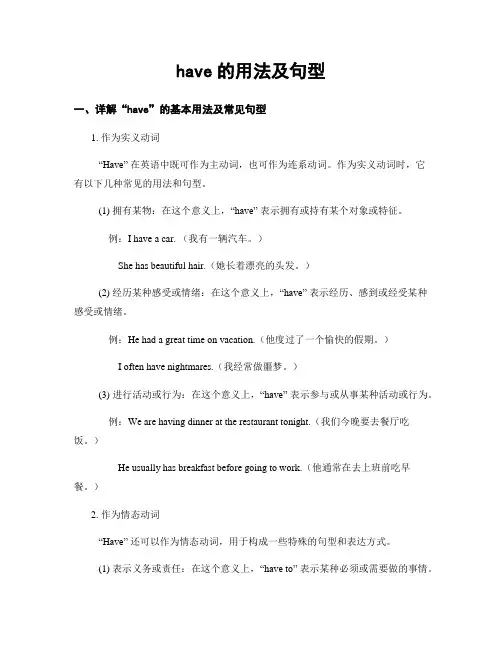
have的用法及句型一、详解“have”的基本用法及常见句型1. 作为实义动词“Have” 在英语中既可作为主动词,也可作为连系动词。
作为实义动词时,它有以下几种常见的用法和句型。
(1) 拥有某物:在这个意义上,“have” 表示拥有或持有某个对象或特征。
例:I have a car. (我有一辆汽车。
)She has beautiful hair.(她长着漂亮的头发。
)(2) 经历某种感受或情绪:在这个意义上,“have” 表示经历、感到或经受某种感受或情绪。
例:He had a great time on vacation.(他度过了一个愉快的假期。
)I often have nightmares.(我经常做噩梦。
)(3) 进行活动或行为:在这个意义上,“have” 表示参与或从事某种活动或行为。
例:We are having dinner at the restaurant tonight.(我们今晚要去餐厅吃饭。
)He usually has breakfast before going to work.(他通常在去上班前吃早餐。
)2. 作为情态动词“Have” 还可以作为情态动词,用于构成一些特殊的句型和表达方式。
(1) 表示义务或责任:在这个意义上,“have to” 表示某种必须或需要做的事情。
例:I have to finish my homework before going out.(我必须在出去之前完成作业。
)They have to follow the rules in order to succeed.(他们必须遵守规则才能成功。
)(2) 表示推测或猜测:在这个意义上,“have” 用于构成一种推测或猜测的语气。
例:She must have forgotten her keys.(她一定忘记带钥匙了。
) They might have gone to the movies.(他们可能已经去看电影了。

连系动词的概念与用法一、连系动词的概念及理解连系动词就是表示不完全谓语关系的动词 ,用于连接主语和表语,说明主语的状态,性质,特征或身份等。
它与其后的表语一起构成谓语。
连系动词有一定的词义,但不完整。
不能单独作谓语,必须和表语连用,构成系表结构,也叫做复合谓语。
二、连系动词的分类连系动词根据其意义特点可分为以下几类:1. 状态系动词:用来表示主语状态,只有be一词。
如:(1)He was famous as a scholar [ˈskɒlə(r)]学者 .作为一位学者他很著名。
(2)We are anxious[ˈæŋkʃəs]焦急的 about his safety.我们为他的安全而忧虑。
(3)The children are very happy. 孩子们很快乐。
2.持续系动词:用来表示主语继续或保持一种状况或态度,主要有:keep保持, remain(仍是), stay(保持)lie躺, stand站 sit坐rest休息, continue [kənˈtɪnju:] 持续等(1)Would you please keep silent [ˈsaɪlənt]沉默的a minute?可以请你安静一下吗?(2)This matter rests a mystery[ˈmɪstri]谜 .此事仍是一个谜。
/It's still a mystery.3.感官系动词:用于表示感官的感受,如:look(看起来), feel(感到、摸起来), sound(听起来),smell(闻起来), taste(尝起来)等。
(1)The rose[rəuz]玫瑰smells sweet [swi:t] 芳香的,甜的.玫瑰花香。
/玫瑰闻起来很香。
(2)The cloth[klɔθ]布 feels soft[sɔft] 柔软的.这布摸上去很柔软。
(3)This coffee tastes bitter[ˈbɪtə(r)]苦的 .这种咖啡味道苦。
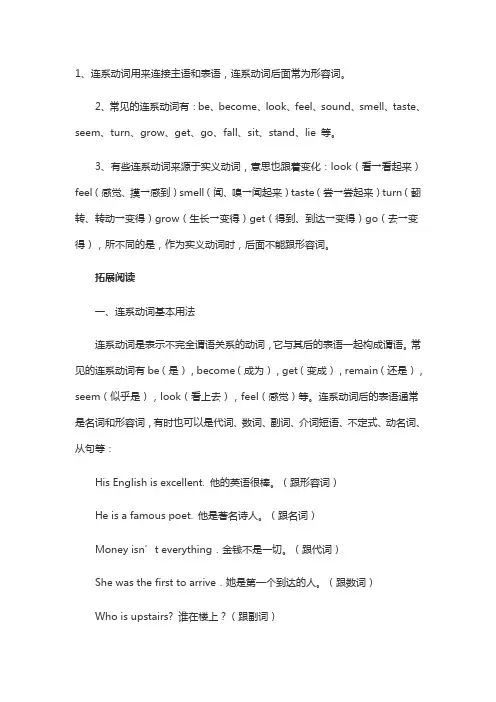
1、连系动词用来连接主语和表语,连系动词后面常为形容词。
2、常见的连系动词有:be、become、look、feel、sound、smell、taste、seem、turn、grow、get、go、fall、sit、stand、lie 等。
3、有些连系动词来源于实义动词,意思也跟着变化:look(看→看起来)feel(感觉、摸→感到)smell(闻、嗅→闻起来)taste(尝→尝起来)turn(翻转、转动→变得)grow(生长→变得)get(得到、到达→变得)go(去→变得),所不同的是,作为实义动词时,后面不能跟形容词。
拓展阅读一、连系动词基本用法连系动词是表示不完全谓语关系的动词,它与其后的表语一起构成谓语。
常见的连系动词有be(是),become(成为),get(变成),remain(还是),seem(似乎是),look(看上去),feel(感觉)等。
连系动词后的表语通常是名词和形容词,有时也可以是代词、数词、副词、介词短语、不定式、动名词、从句等:His English is excellent. 他的英语很棒。
(跟形容词)He is a famous poet. 他是著名诗人。
(跟名词)Money isn’t everything.金钱不是一切。
(跟代词)She was the first to arrive.她是第一个到达的人。
(跟数词)Who is upstairs? 谁在楼上?(跟副词)He is with his friends. 他和朋友在一起。
(跟介词短语)He seems to be ill. 他似乎病了。
(跟不定式)Seeing is believing. 眼见为实。
(跟动名词)This is what you need. 这就是你需要的。
(跟从句)二、学习连系动词应注意的两点关于连系动词后接副词作表语连系动词后通常可接形容词作表语,一般不接副词:误:His English is very well. 他的英语很好。
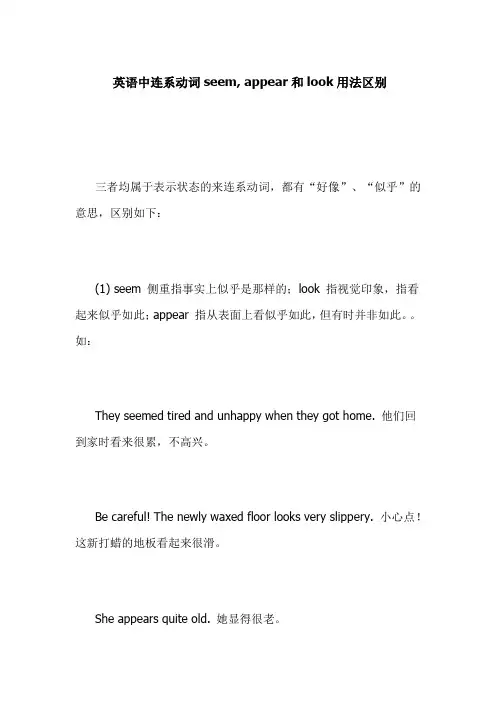
英语中连系动词seem, appear和look用法区别三者均属于表示状态的来连系动词,都有“好像”、“似乎”的意思,区别如下:(1) seem 侧重指事实上似乎是那样的;look 指视觉印象,指看起来似乎如此;appear 指从表面上看似乎如此,但有时并非如此。
如:They seemed tired and unhappy when they got home. 他们回到家时看来很累,不高兴。
Be careful! The newly waxed floor looks very slippery. 小心点!这新打蜡的地板看起来很滑。
She appears quite old. 她显得很老。
(2) 三者均可后接不定式,但look 之后一般只限于to be(且较少见):The man seems / appears / looks to be very tired. 那人好像很疲劳。
He seemed / appeared to have met her before. 他以前似乎见过她。
(3) 三者均可用于it 开头的句子,且三者之后均可接从句。
如:It seemed / as if / though the day would never end. 似乎白天永远也过不完。
It looked as if he had been ill. 他看起来像是生过病。
It seems / appears that he is very rich. 他似乎很富有。
为避免重复,appear和seem后接的that 从句有时可用so或not代替。
如:“Is he an honest man ?”“It seems / appears so / not.”“他是诚实的人吗?”“似乎是/ 不是。
”(4) look, seem 之后可接like短语,但appear 之后一般不能:You look like your father. 你看起来像你父亲。
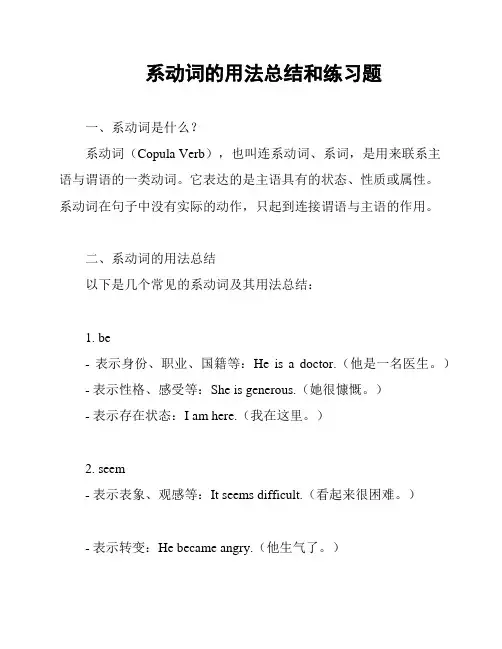
系动词的用法总结和练习题一、系动词是什么?系动词(Copula Verb),也叫连系动词、系词,是用来联系主语与谓语的一类动词。
它表达的是主语具有的状态、性质或属性。
系动词在句子中没有实际的动作,只起到连接谓语与主语的作用。
二、系动词的用法总结以下是几个常见的系动词及其用法总结:1. be- 表示身份、职业、国籍等:He is a doctor.(他是一名医生。
)- 表示性格、感受等:She is generous.(她很慷慨。
)- 表示存在状态:I am here.(我在这里。
)2. seem- 表示表象、观感等:It seems difficult.(看起来很困难。
)- 表示转变:He became angry.(他生气了。
)4. feel- 表示感觉:I feel tired.(我感到疲倦。
)5. look- 表示外观、样子等:She looks beautiful.(她看起来很漂亮。
)6. sound- 表示听觉感受:It sounds nice.(听起来不错。
)7. taste- 表示味道:It tastes delicious.(尝起来很美味。
)8. smell- 表示气味:The flowers smell sweet.(花香四溢。
)三、系动词练题根据上述系动词的用法总结,完成以下练题:1. 请用合适的系动词填空:- The soup ___________ salty.- They ___________ happy after winning the game.- She ___________ tired after a long day.2. 请将以下句子中的系动词找出来:- The book looks interesting.- John is a teacher.- The movie seemed boring at first.参考答案:1. tastes, are, feels2. looks, is, seemed以上是对系动词的用法总结和练习题的文档。

英语系动词详细用法汇总定义 (2)分类 (3)注意事项 (4)专项训练 (9)怎样区分半连系动词 (11)系动词系动词,亦称连系动词(Link Verb)。
作为系动词,它本身有词义,但不能单独用作谓语,后边必须跟表语,亦称补语(形容词),构成系表结构说明主语的状况、性质、特征等情况。
例如:He feel ill yesterday. 他昨天病了。
(feel是系动词,后跟补足语,说明主语情况。
)有些系动词又是实义动词,该动词表达实义时,有词义,可单独作谓语,关于连系动词后接不定式■ 连系动词 be 后根据情况可自由地接不定式作表语:1).My dream is to be a scientist. 我的梦想是当一名科学家。
2).All you have to do is to listen. 你只需要听。
■ seem, appear, prove, turn out, grow等连系动词后也可接不定式(尤其是 to be)短语作表语:1).The man seemed to be ill. 这个人好像病了。
2).The plan proved to be useful. 这个计划证明是有用的。
3).He appears to know this. 他好像知道这一点。
4).The weather turned out to be fine. 天气结果很好。
5).He has grown to like studying English. 他渐渐喜欢学英语了。
若所接不定式为to be,通常可以省略be。
■ sound, smell, feel, taste, become 等连系动词后通常不能接不定式:误:These oranges taste to be good. (应去掉 to be)误:The roses smell to be nice. (应去掉 to be)连系动词look后有时也可接to be,但以省略to be为多。
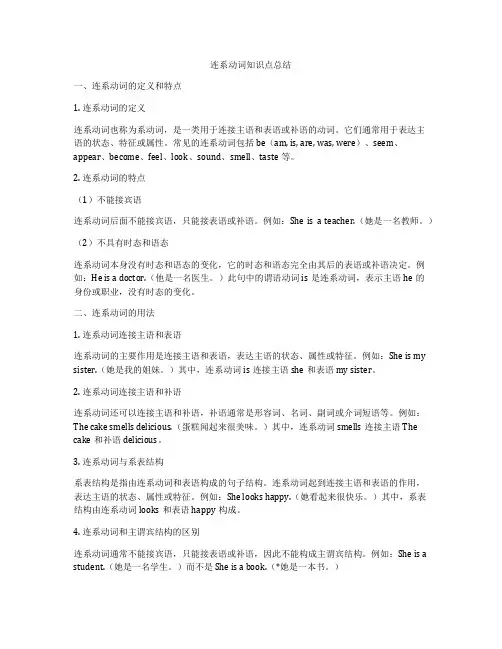
连系动词知识点总结一、连系动词的定义和特点1. 连系动词的定义连系动词也称为系动词,是一类用于连接主语和表语或补语的动词。
它们通常用于表达主语的状态、特征或属性。
常见的连系动词包括be(am, is, are, was, were)、seem、appear、become、feel、look、sound、smell、taste等。
2. 连系动词的特点(1)不能接宾语连系动词后面不能接宾语,只能接表语或补语。
例如:She is a teacher.(她是一名教师。
)(2)不具有时态和语态连系动词本身没有时态和语态的变化,它的时态和语态完全由其后的表语或补语决定。
例如:He is a doctor.(他是一名医生。
)此句中的谓语动词is是连系动词,表示主语he的身份或职业,没有时态的变化。
二、连系动词的用法1. 连系动词连接主语和表语连系动词的主要作用是连接主语和表语,表达主语的状态、属性或特征。
例如:She is my sister.(她是我的姐妹。
)其中,连系动词is连接主语she和表语my sister。
2. 连系动词连接主语和补语连系动词还可以连接主语和补语,补语通常是形容词、名词、副词或介词短语等。
例如:The cake smells delicious.(蛋糕闻起来很美味。
)其中,连系动词smells连接主语The cake和补语delicious。
3. 连系动词与系表结构系表结构是指由连系动词和表语构成的句子结构。
连系动词起到连接主语和表语的作用,表达主语的状态、属性或特征。
例如:She looks happy.(她看起来很快乐。
)其中,系表结构由连系动词looks和表语happy构成。
4. 连系动词和主谓宾结构的区别连系动词通常不能接宾语,只能接表语或补语,因此不能构成主谓宾结构。
例如:She is a student.(她是一名学生。
)而不是She is a book.(*她是一本书。
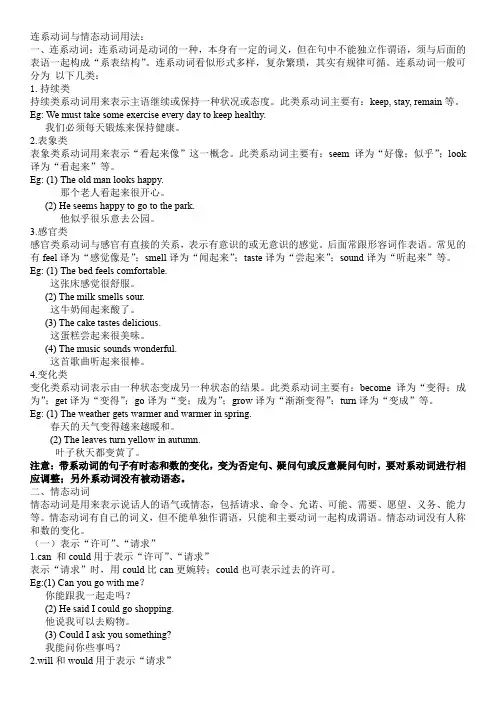
连系动词与情态动词用法:一、连系动词:连系动词是动词的一种,本身有一定的词义,但在句中不能独立作谓语,须与后面的表语一起构成“系表结构”。
连系动词看似形式多样,复杂繁琐,其实有规律可循。
连系动词一般可分为以下几类:1.持续类持续类系动词用来表示主语继续或保持一种状况或态度。
此类系动词主要有:keep, stay, remain等。
Eg: We must take some exercise every day to keep healthy.我们必须每天锻炼来保持健康。
2.表象类表象类系动词用来表示“看起来像”这一概念。
此类系动词主要有:seem 译为“好像;似乎”;look 译为“看起来”等。
Eg: (1) The old man looks happy.那个老人看起来很开心。
(2) He seems happy to go to the park.他似乎很乐意去公园。
3.感官类感官类系动词与感官有直接的关系,表示有意识的或无意识的感觉。
后面常跟形容词作表语。
常见的有feel译为“感觉像是”;smell译为“闻起来”;taste译为“尝起来”;sound译为“听起来”等。
Eg: (1) The bed feels comfortable.这张床感觉很舒服。
(2) The milk smells sour.这牛奶闻起来酸了。
(3) The cake tastes delicious.这蛋糕尝起来很美味。
(4) The music sounds wonderful.这首歌曲听起来很棒。
4.变化类变化类系动词表示由一种状态变成另一种状态的结果。
此类系动词主要有:become译为“变得;成为”;get译为“变得”;go译为“变;成为”;grow译为“渐渐变得”;turn译为“变成”等。
Eg: (1) The weather gets warmer and warmer in spring.春天的天气变得越来越暖和。
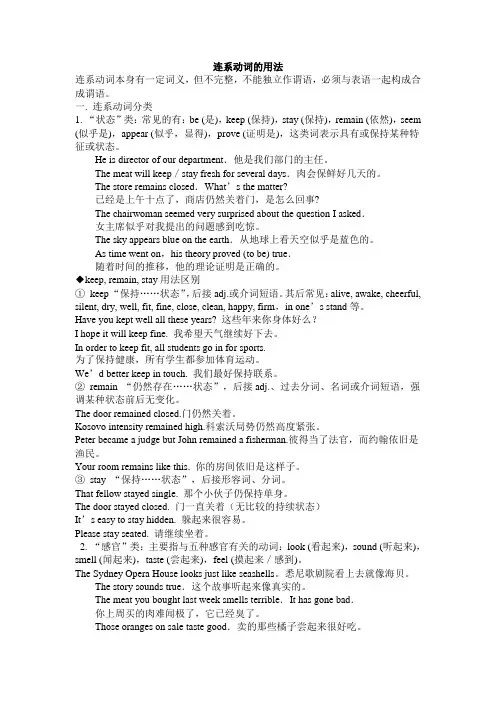
连系动词的用法连系动词本身有一定词义,但不完整,不能独立作谓语,必须与表语一起构成合成谓语。
一. 连系动词分类1. “状态”类:常见的有:be (是),keep (保持),stay (保持),remain (依然),seem (似乎是),appear (似乎,显得),prove (证明是),这类词表示具有或保持某种特征或状态。
He is director of our department.他是我们部门的主任。
The meat will keep/stay fresh for several days.肉会保鲜好几天的。
The store remains closed.What’s the matter?已经是上午十点了,商店仍然关着门,是怎么回事?The chairwoman seemed very surprised about the question I asked.女主席似乎对我提出的问题感到吃惊。
The sky appears blue on the earth.从地球上看天空似乎是蓝色的。
As time went on,his theory proved (to be) true.随着时间的推移,他的理论证明是正确的。
◆keep, remain, stay用法区别①keep “保持……状态”,后接adj.或介词短语。
其后常见:alive, awake, cheerful, silent, dry, well, fit, fine, close, clean, happy, firm,in one’s stand等。
Have you kept well all these years? 这些年来你身体好么?I hope it will keep fine. 我希望天气继续好下去。
In order to keep fit, all students go in for sports.为了保持健康,所有学生都参加体育运动。
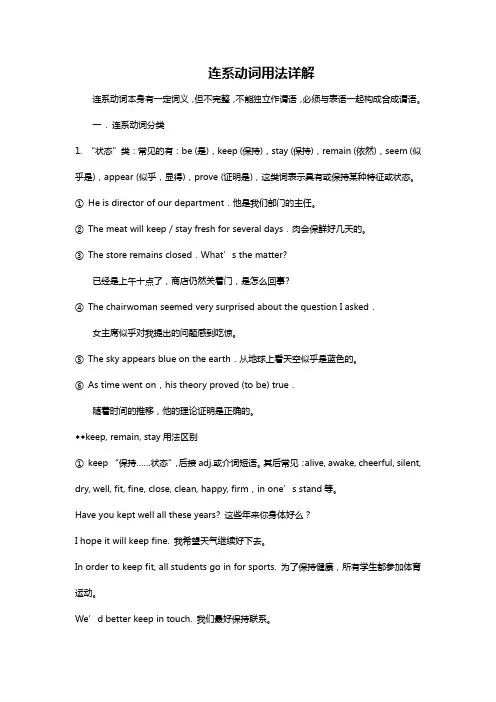
连系动词用法详解连系动词本身有一定词义,但不完整,不能独立作谓语,必须与表语一起构成合成谓语。
一 . 连系动词分类1. “状态”类:常见的有:be (是),keep (保持),stay (保持),remain (依然),seem (似乎是),appear (似乎,显得),prove (证明是),这类词表示具有或保持某种特征或状态。
①He is director of our department.他是我们部门的主任。
②The meat will keep/stay fresh for several days.肉会保鲜好几天的。
③The store remains closed.What’s the matter?已经是上午十点了,商店仍然关着门,是怎么回事?④The chairwoman seemed very surprised about the question I asked.女主席似乎对我提出的问题感到吃惊。
⑤The sky appears blue on the earth.从地球上看天空似乎是蓝色的。
⑥As time went on,his theory proved (to be) true.随着时间的推移,他的理论证明是正确的。
◆◆keep, remain, stay用法区别①keep “保持……状态”,后接adj.或介词短语。
其后常见:alive, awake, cheerful, silent, dry, well, fit, fine, close, clean, happy, firm,in one’s stand等。
Have you kept well all these years? 这些年来你身体好么?I hope it will keep fine. 我希望天气继续好下去。
In order to keep fit, all students go in for sports. 为了保持健康,所有学生都参加体育运动。
连系动词的用法讲解及练习题一"be":is am are四"变":get become turn go五"感官":feel taste smell sound look系动词系动词亦称联系动词(Link Verb),作为系动词,它本身有词义,但不能单独用作谓语,后边必须跟表语(亦称补语),构成系表结构说明主语的状况、性质、特征等情况。
说明:有些系动词又是实义动词,该动词表达实义时,有词义,可单独作谓语,例如:He fell ill yesterday.他昨天病了。
(fell是系动词,后跟补足语,说明主语情况。
)He fell off the ladder.他从梯子上摔下来。
fell是实义动词,单独作谓语。
1)状态系动词用来表示主语状态,只有be一词,例如:He is a teacher. 他是一名教师。
(is与补足语一起说明主语的身份。
)2)持续系动词用来表示主语继续或保持一种状况或态度,主要有keep, rest, remain, stay, lie, stand, 例如:He always kept silent at meeting. 他开会时总保持沉默。
This matter rests a mystery. 此事仍是一个谜。
3)表像系动词用来表示"看起来像"这一概念,主要有seem, appear, look, 例如:He looks tired. 他看起来很累。
He seems (to be) very sad. 他看起来很伤心。
4)感官系动词感官系动词主要有feel, smell, sound, taste, 例如:This kind of cloth feels very soft.这种布手感很软。
This flower smells very sweet.这朵花闻起来很香。
5)变化系动词这些系动词表示主语变成什么样,变化系动词主要有become, grow, turn, fall, get, go, come, run.例如:He became mad after that. 自那之后,他疯了。
13.[甘肃白银] — Excuse me,is this the right way to the Children's Palace?— Sorry,I'm not sure.But it _____ be.A.mustn'tB.mightC.can'tD.must14.[四川内江] — Look,the lady in red _____ be our English teacher.— No,she _____ be.She is in the office now.A.must;can'tB.can;mustn'tC.may;mustn'tD.shall;can't15.[重庆考题] — Must we finish the work today?— _____.We have something else to do tomorrow.A.Yes,we canB.No,we can't.C.Yes,we must.D.No,we needn't【答案速递】1.C2.C3.D4.A5.D6.A7.D8.B9.B 10.C 11.B 12.C 13.B 14.A 15.C第十一章连系动词连系动词又称系动词,是表示主语身份、性质、状态的动词。
连系动词在句子中不能单独作谓语,总是与后面作表语的名词、形容词、代词或分词一起构成系表结构,集体充当句子的谓语。
连系动词只有主动式,没有被动式。
如:His father is an English teacher.他父亲是个英语老师。
The cakes my mother cooked taste delicious.我妈妈做的蛋糕很好吃。
11-1 连系动词的5种类型连系动词根据其性质可分为状态系动词、持续系动词、表象系动词、感官系动词和变化系动词五种类型。
1.状态系动词表示人或事物状态的系动词称为状态系动词。
关于being的两种用法介绍详解being的用法既可以是谓语动词,也可以是非谓语动词。
你学了being这个词吗?知道being的用法吗?下面就是小编整理的关于being的两种用法介绍详解,希望大家喜欢。
目录being用作谓语动词的用法1.当 being 为连系动词时,用作谓语动词的 being 主要与形容词连用,表示临时特征或暂时现象.如:You’re being stupid.你真傻.You are not being very polite.你可是不大客气呀.Your brother is being very annoying this evening.你兄弟今晚很烦人.2.当 being 为助动词时,用作谓语动词的 being 主要与过去分词连用,构成被动语态.如:I’m always being criticized.我总是挨批.He is being interviewed now.他现在正在接受面试.He is being met at the station tonight.今晚有人去车站迎接他. being用作非谓语动词的用法1.当 being 为助动词时,用作非谓语动词的 being 具有以下用法:(1) 作主语.如:Being lost can be a terrifying experience.迷路可能是一种很可怕的经历.Being recognized wherever you go is the price you pay for being famous.出名所付出的代价是不管你走到哪里,都会被人认出来.(2) 作定语.如:Did you see that boy being questioned by the police?你看见那个男孩受到警察的盘问了吗?We are going to reduce the number of trees being cut down.我们要减少砍伐的树的数量.(3) 作状语.如:Being given a chance,she immediately jumped at it.给了她这个机会,她立刻抓住了.Being well taken care of,she recovered quickly.她受到很好的照顾,身体恢复得很快.(4) 作宾语.如:He can’t stand being kept waiting.让他等着,他可不干.Do you like being stared at?你愿意人家盯着你看吗?(5) 作宾语补足语.如:I saw him being taken away by the police.我看到他正被警察带走.I found myself being drawn into another dreary argument.我发现竟然身不由己又参与了一次无聊的争论.It’s interesting (for children) to see a house being built.(孩子们)看造房子是挺有趣的事.注:有时 being可带有自己的逻辑主语(构成独立主格结构).如:The question being settled,we went home.问题解决之后,我们就回家了.2.当 being 为连系动词时,用作非谓语动词的 being 具有以下用法:(1) 作主语.如:Being tired often makes me short-tempered.我一累就容易发脾气.Being deaf and dumb makes communication very difficult.又聋又哑很难与人交往.(2) 作状语.如:Being anxious to please him,I bought him a nice present.因为我想讨好他,我给他买了一件好礼物.Being unemployed,he hasn’t got much money.由于他没有工作,他没有多少钱.(3) 作宾语.如:I don’t like being in the office all day.我不喜欢整天呆在办公室里.You can be alone without being lonely.你可以独处而不感到寂寞.(4) 作宾语补足语.如:He said it to stop her being too proud.他说这话是想要她不要太骄傲.I’m sorry to see you being so sad about it.看到你对这事这样伤心,我很难过.She complains of the room being too small for her.她埋怨房间太小了.(5) 用于独立主格结构.如:It being a holiday,all the shops were shut.由于是假日,所有商店都关门了.The weather being hot,we had to stay at home.由于天气炎热,我们只好呆在家里.There being no further business,l declare the meeting closed.没有再要讨论的事了,我宣布散会.Other things being equal,Alice would marry Jim.如果其他条件都一样的话,爱莉丝就会嫁给吉姆.being的常用短语用作名词 (n.)bring into being使某事物产生〔存在〕 cause sth to have reality or existence bring sth into beingcome into being开始存在 begin to existbeing的用法例句1. Doctors are complaining about being barraged by drug-company salesmen.医生们抱怨他们疲于应付医药公司的销售人员。
动词分为行为动词,系动词和助动词行为动词又称实意动词,表示具体动作的词情感动词是表示人的感情或心理状态的动词.系动词亦称联系动词(Link Verb),作为系动词,它本身有词义,但不能单独用作谓语,后边必须跟表语(亦称补语),构成系表结构说明主语的状况、性质、特征等情况。
系动词分为1状态-:be, 2持续-:keep, rest, remain, stay, lie, stand等,3表像-:seem, appear, look,4感官-:feel, smell, sound, taste等,5变化-:become, grow, turn, fall, get, go, come, run等,6终止-prove, trun out等协助主要动词构成谓语动词词组的词叫助动词(Auxiliary Verb)。
最常用的助动词有:be, have, do, shall, will, should, would一.按照作用和用途,英语动词可分为三类:行为动词、be动词、助动词。
行为动词表示动作,be动词表示状态,助动词没有实际词意,只起语法作用。
e.g. I went there yesterday. (went表示“去”这个动作,因此为行为动词)I am a student.(be动词“am” 表示状态,强调我的学生身份)I did not help him.(did 在这里没有实际词意,只不过为了否定句子必须借用它,因此它是助动词)简而言之,行为动词就是表示动作的动词。
它分为及物动词和不及物动词两种。
二.我想应该是情态动词而不是情感动词.情态动词的语法特征1)情态动词不能表示正在发生或已经发生的事情,只表示期待或估计某事的发生。
2)情态动词除ought 和have 外,后面只能接不带to 的不定式。
3)情态动词没有人称,数的变化,即情态动词第三人称单数不加-s。
4)情态动词没有非谓语形式,即没有不定式,分词,等形式。
系动词,亦称连系动词(LinkingVerb ),是用来帮助说明主语的动词。
它自己有词义,但不可以独自用作谓语,后来一定跟表语,组成系表构造说明主语的状况、性质、特点等状况。
在英语中,系动词的功能主假如把表语(名词、形容词、某些副词、非谓词、介词短语、从句)和它的主语联系在一同,说明主语的性质、特点、品性或状态。
它有自己的但不完整的词义,不可以在句中独立作谓语,一定和后边的表语一同组成句子的谓语。
它虽是虚词,可是其用法是复杂的,并且不行忽略。
对于连系动词后接不定式■连系动词 be(am,is,are) 后依据状况可自由地接不定式作表语:1).Mydreamistobeascientist.我的梦想是当一名科学家。
2).Allyouhavetodoistolisten.你只要要听。
■seem,appear,prove,turnout,grow 等连系动词后也可接不定式 (特别是 tobe) 短语作表语:1).Themanseemedtobeill.这个人仿佛病了。
2).Theplanprovedtobeuseful.这个计划证明是实用的。
3).Heappearstoknowthis.他仿佛知道这一点。
4).Theweatherturnedouttobefine.天气结果很好。
5).HehasgrowntolikestudyingEnglish.他逐渐喜爱学英语了。
若所接不定式为tobe ,往常能够省略 tobe 。
■ sound,smell,feel,taste,become等连系动词后往常不可以接不定式:(也能够理解为用主动表被动)误: Theseorangestastetobegood.(应去掉tobe)误: Therosessmelltobenice.(应去掉tobe)连系动词 look 后有时也可接 tobe ,但以省略 tobe 为多。
用法总结:一般地,系动词后接表语: [包含形容词(原级、比较级和最高等均可加)、不定式等 ]。
连系动词用法详解连系动词本身有一定词义,但不完整,不能独立作谓语,必须与表语一起构成合成谓语。
一 . 连系动词分类1. “状态”类:常见的有:be (是),keep (保持),stay (保持),remain (依然),seem (似乎是),appear (似乎,显得),prove (证明是),这类词表示具有或保持某种特征或状态。
① He is director of our department.他是我们部门的主任。
② The meat will keep/stay fresh for several days.肉会保鲜好几天的。
③ The store remains closed.What’s the matter已经是上午十点了,商店仍然关着门,是怎么回事④ The chairwoman seemed very surprised about the question I asked.女主席似乎对我提出的问题感到吃惊。
⑤ The sky appears blue on the earth.从地球上看天空似乎是蓝色的。
⑥ As time went on,his theory proved (to be) true.随着时间的推移,他的理论证明是正确的。
◆◆keep, remain, stay用法区别① keep “保持……状态”,后接adj.或介词短语。
其后常见:alive, awake, cheerful, silent, dry, well, fit, fine, close, clean, happy, firm,in one’s stand等。
Have you kept well all these years 这些年来你身体好么I hope it will keep fine. 我希望天气继续好下去。
In order to keep fit, all students go in for sports. 为了保持健康,所有学生都参加体育运动。
We’d better keep in touch. 我们最好保持联系。
②remain “仍然存在……状态”,后接adj.、过去分词、名词或介词短语,强调某种状态前后无变化。
The door remained closed.门仍然关着。
Kosovo intensity remained high.科索沃局势仍然高度紧张。
Peter became a judge but John remained a fisherman.彼得当了法官,而约翰依旧是渔民。
Your room remains like this. 你的房间依旧是这样子。
③ stay “保持……状态”,后接形容词、分词。
That fellow stayed single. 那个小伙子仍保持单身。
The door stayed closed. 门一直关着(无比较的持续状态)It’s easy to stay hidden. 躲起来很容易。
Please stay seated. 请继续坐着。
2. “感官”类:主要指与五种感官有关的动词:look (看起来),sound (听起来),smell (闻起来),taste (尝起来),feel (摸起来 / 感到)。
The Sydney Opera House looks just like seashells。
悉尼歌剧院看上去就像海贝。
The story sounds true.这个故事听起来像真实的。
The meat you bought last week smells terrible.It has gone bad.你上周买的肉难闻极了,它已经臭了。
Those oranges on sale taste good.卖的那些橘子尝起来很好吃。
Silk feels soft.丝绸摸上去很柔软。
3. “变化”类:常见的有三组⑴ turn (变成),grow (变得),get (变成),become (变成),make ()⑵ come (变得),go (变得),⑶ fall (进入某状态), run (变成,进入)4. 双谓语系动词此类系动词既有系动词的功能,后接表语,又保留原实义动词本身的含义。
例如:The run rose red. 太阳升起红艳艳。
She stopped and stood quite still. 她停下来然后一丝不动地站着。
The book lay open on the table. 那书在桌子上打开着。
The snow lay thick on the ground. 雪厚厚地堆积在地上。
He married young. 他结婚很早。
The window blew open. 窗户吹开了。
She blushed as red as a peony. 她的脸红得像一朵牡丹花。
Lei Feng died young. 雷锋早逝。
The material has worn thin. 这种布料已穿薄了。
The weather continued calm. 天气仍然平静。
He continued silent.他继续沉默不语。
二. become, come, go, get, grow, turn的用法与区别1. become 和get主要指一个人暂时性的身心变化或永久性的自然变化。
另外,become 和 get 还可用于指天气的变化和社会的趋势。
如:⑴ become / get / angry, famo us, ill, old, well, deaf, strong:生气,成名,得病,变老,痊愈,变聋,变强⑵ get dressed 穿衣服 get changed 换衣服It’s becoming / getting cold (dark, cloudy, etc). 天渐冷了(黑了,多云了等)。
Divorce is becoming / getting more common. 离婚现象越来越常见了。
Last night I got caught in the downpour. 昨夜我被雨淋了(表示意想不到)The new car got scratched. 新车给刮坏了。
(表突发性)2. go 和come表示变化时,前者主要指一种由强到弱或由好到坏的变化,后者则主要指向好的方面变化。
come和go还可接有否定前缀的过去分词。
go bald / deaf / insane 发秃/ 变聋 / 发疯 go blind变瞎go hungry 挨饿, go naked 光着身子His report went unnoticed. 他的报告没人注意。
The meat’s gone bad. 肉变坏了。
The radio’s gone wrong. 收音机出毛病了。
Her wish came true. 她的愿望实现了。
[来源:]Everything came right. 一切顺利。
【注】come 除表示向好的方面变化外,还有以下常见搭配值得注意:come untied 解开,come loose 变松,come undone 松开3. go和turn还可用于人或事物颜色的变化。
She went / turned blue with cold. 她冻得脸色发青了。
The rotten meat went / turned green. 这块腐烂的肉变绿了。
4. grow:”渐渐变得……起来,长得”。
主要表示逐渐变化,强调变化的过程:It began to grow dark. 天色渐渐黑了。
The sea is growing calm. 大海变得平静起来。
The pollution problem is growing serious. 污染问题日见严峻。
My younger brother is growing tall.我的弟弟渐渐长高了。
5. make也可表示某人或某物发生了某些变化,含义为:①合计为②成为,适合作,宜用作,具备…的素质。
make后接名词时,名词前通常加限定词。
Two and two make four. 2加2等于4。
They made friends. 他们交上了朋友。
Penny will make a very good teacher. 彭尼将成为一名很好的老师。
An old cardboard box makes a comfortable bed for a kitten. 旧纸箱给小猫当床是很舒服的。
6. turn指改变特性、本质、状态等。
还指到达或超过某一年龄或时间。
The milk turned sour.牛奶变酸了。
So next year you will turn 16.7. become与turn都可以接名词,become后的名词前有冠词,turn后的名词无冠词且常用单数。
He turned writer after he graduated from a medical college. 他从医学院毕业后当了作家。
She became a lawyer. 她成了一名律师。
.8. run:变成,进入……状态。
后面接short, dry, low, deep等词,主语多为能流动,能消耗掉的东西。
如:run short / low ……没胜多少,快用完 run short of sth 快用完……run dry 干涸 run wild 放肆,撒野Still waters run deep. 水静流深,人静心深。
They ran out of money.Their money was running short.Still waters run deep.Don't let the children run wild.9. fall”进入(某种状态),成为”,后常接以下形容词:asleep, lame, silent, ill, sick, flat.[来源:学。
科。
网Z。
X。
X。
K]fall ill 生病 fall short 没中, fall apart 散开, fall silent 沉默fall flat直挺挺地倒达不到预想效果;彻底失败下 fall lame 变瘸The old men, unable to express himself, fell silent. 那位老人说不清自己的意思,就不作声了。
My father fell ill and died.我的父亲生病死了。
His horse fell lame.他的马瘸了。
She fell flat on her face as she got out of the car. 她一下车便直挺挺地脸朝下倒了下去。